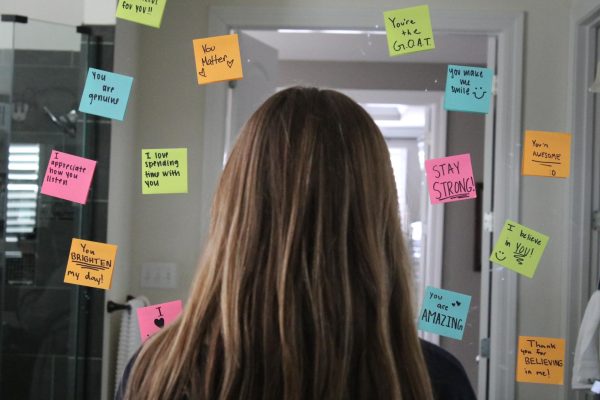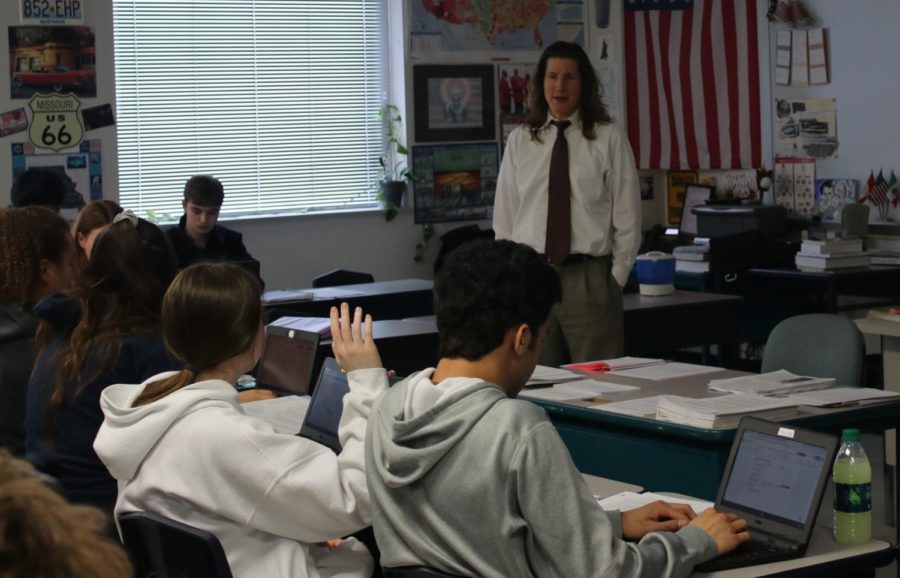Snowy Winter Rest – End Of Semester Distress
Media by Michael Schmitz
Scott Szevery, Advanced Placement United States History fourth hour teacher, answers class questions on Mar. 13 concerning the draft during World War II.
“To me the purpose of taking an AP class is to get the AP credit and to do well on the exam,” Shalini Yagnik, junior, said.
Yagnik, along with other RSD students and teachers, has found that the four snow days and one snow early release this year have made it more difficult to get through the content and material necessary for the Advanced Placement exam.
“I think they’ve created a time crunch with certain tests being pushed back,” Yagnik said. “For me personally though, I liked pushing it back because then I had a day to just study [at home]. So I didn’t think the snow days have been stressful, in fact they’ve been to my advantage.”
A student in the AP Chemistry, AP Calculus AB, and AP Language and Composition classes Yagnik values the potential college credit and deeply cares about her results for the May exams.
“Some classes I would prefer to have everyday, and having them every other day makes me want to put off the homework,” Yagnik said.
While Yagnik was able to use her snow days to get ahead on her work, AP Chemistry teacher Edward Bolton was getting behind on work that needed to be done in class.
“This year we’re definitely facing a deadline,” Bolton said. “I’ve cancelled a lab just because I need more time to go over the material.”
Similar to Yagnik, Bolton has found that the new schedule has made scheduling school work harder.
“Going to less blocked days definitely has an impact,” Bolton said. “You have to think about what labs you have to do, maybe try some different labs, or not do certain labs because they just take more time.”
Bolton said that while the adjusted schedule might not be perfectly ideal for his class, he recognizes that he’s not the only teacher affected by it.
“It’s one of those compromises in life where no one is really happy, which probably means that it’s an okay compromise,” Bolton said.
Bolton said that this year will be little different for his students, with missing labs and having less exam review time, but he remains confident in their ability.
“Instead of two weeks of review, we’ll probably have one, but this isn’t these kids’ first rodeo,” Bolton said. “They’ve been taking AP classes for years, and these students are really smart and motivated.”
In light of these setbacks, AP European History teacher Amy Doyle concurs with Bolton’s faith in the students.
“Every year has its challenges, but every year I have students who are constantly willing to work hard and do well,” Doyle said. “It’s really the work ethic that the year’s end result is eventually based upon.”
Just like Bolton, Doyle’s class is on a race against the clock for the upcoming AP exam. She’s had to cut out project research days and important films such as “Schindler’s List.”
“Making sure that we cover the curriculum is always a struggle, and the fact that we’ve had four or five snow days coupled with the fact that our AP exam is a week and a half sooner this year is also tough,” Doyle said.
Though the race to finish curriculum appears difficult, Doyle pointed out that the new blocked format for AP European History has been advantageous. In class, Doyle said she is able to intricately delve into topics without being interrupted by the bell and being forced to start over again the next day.
“I think moving to the blocked schedule has worked to our advantage in AP Euro,” Doyle said. “It’s allowed for me to cover topics more thoroughly.”
Even though it appears that her students will be learning new content right up until her class’s exam, Doyle has little doubt that her students will do as well as they always do.
“You know, whether it’s covering something faster or asking kids to cover something at home that’s maybe less complicated, there’s always one way to make it work,” Doyle said.
Your donation will support the student journalists of Marquette High School. Your contribution will allow us to purchase equipment and cover our annual website hosting costs. You may become a PATRON by making a donation at one of these levels: White/$30, Green/$50, Blue/$100. Patron names will be published in the print newsmagazine, on the website and once per quarter on our social media accounts.

Michael Schmitz, senior, is a foreign correspondent for the Messenger. During his time in Israel, he will utilize his background in political analysis...







